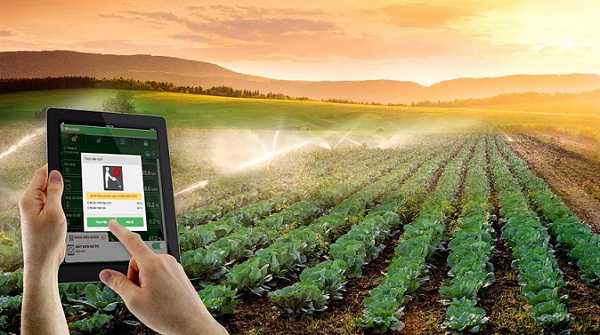Blockchain, also known as blockchain technology, is known as a system of hundreds to millions of personal computers that makes the database not only decentralized but also independently distributed. So what are the positive impacts of this system on agriculture?
Traceability support
First of all, blockchain solves the problem of information validation. Specifically, the blockchain system records all transactions that take place and everyone present on the system can see and have the right to verify the accuracy of that transaction. This solves a very important issue in the trading of agricultural products in particular and consumer goods in general – that is trust in product quality. With blockchain technology, this problem is completely solved. Information of sold products is always saved in the most detailed process, allowing customers to know from the origin, to the still transferring party, to the supplier…
Besides, the information in each blockchain is designed to be almost immutable and needs to be verified by all nodes (users) in the system, so the reliability of the information is recorded as close as possible. as absolute. This not only stimulates the agricultural industry to produce products with quality standards, but also helps consumers feel secure to use, thereby stimulating sales.
Blockchain will fundamentally change the global agricultural industry and greatly improve the ability of businesses and individuals to track the production and processing of agricultural products.
However, in Vietnam, blockchain application in agriculture is still very new. Currently, technology along with land accumulation, policy life and linkages between businesses and farmers are still the four fundamental bottlenecks in the development of high-tech agriculture.
Growing blockchain mango
“For nearly a month continuously, the mangoes just came out – it’s gone – the mangoes are not enough to supply to the agents and cooperatives, we are very sorry that many times we have to give the mangoes alternately to have enough orders”, My Mango Cooperative Recently shared bone on Fanpage. After applying blockchain traceability technology, Dong Thap’s Cat Chu mangoes cannot be grown for sale.
500 mangoes grown using blockchain technology of My Xuong Cooperative – a well-known cooperative in Dong Thap with Cat Chu mango product was first introduced at Vietnam Blockchain Summit 2018 held in June 2018.
Thanks to blockchain technology applied in traceability, when holding a mango of My Xuong Cooperative with a QR Code attached, consumers can know the production, distribution, and usage of the product. even how sweet and sour the mango is, it tastes just right when you eat it…
According to recent information from Mr. Do Van Long, Chairman, Office Director of Infinity Blockchain Labs – the unit that supports blockchain technology for My Xuong mango, at the conference “Data governance – Challenges beyond the industry 4.0” took place recently: Up to now, My Xuong Cooperative has almost no mangoes for sale. The products produced are purchased quite well because they can prove the origin from transporting to preserving the mango.
“The way we do it is to make the data transparent on the blockchain, all stages of the mango fruit passing are stored and uploaded to the system, with the consensus of the participants in the chain, from the producer cooperative to the consumer. participate in transportation, distribution, point of sale to end users,” said Mr. Long.
Yield increased by 25%, irrigation water reduced by 35%
Mimosa Technology (Mimosatek), a startup operating in the field of precision agriculture since late 2014, has many ideas derived from observing how farmers operate their farms.
Mr. Nguyen Khac Minh Tri, CEO of Mimosatek, said that the excessive use of resources from irrigation water, fertilizers, pesticides to the management and feeding of the fishery industry by farmers, The numbers are based more on experience than on the actual needs of plants and animals.
Citing the World Bank’s Vietnam development report (World Bank), Mr. Tri said that the growth rate of total factor productivity (TFP) in Vietnam’s agricultural sector has been on a downward trend since then. since 2000. In a nutshell, TFP is an index that calculates gains compared to expenses. Around the world, TFP is increasing, which means that the world’s farmers “put in” less but get a lot.
When it comes to irrigation water alone, when Mimosatek goes to meet farmers, farmers or companies operating in agricultural irrigation, only one very specific question is: “Today, in this crop, Under such conditions, approximately how much water is appropriate for the plants?”, but they did not get an exact answer while irrigation is a fundamental and very important problem in the agricultural field. .
Experimenting on 1 hectare of tomato plants, while traditional agriculture only relies on experience to provide irrigation every 3 days, 30 minutes each time, when applying technology, attaching soil moisture sensors, At the same time, monitoring the evaporation of plants, the software automatically calculates the balance to see how much watering every day. Result: The amount of irrigation water applied using the technology is 35% more economical than that of the traditional method, while crop yields increase by 25%.
According to a statistic of the Institute of Policy and Strategy for Agriculture and Rural Development (IPSARD), TFP accounted for an average of 40% of Vietnam’s agricultural growth in recent years, while Thailand was 83%, China National 86% and Malaysia 92%.
Spread to the agricultural industry
Blockchain is a new application solution in the technology world not only in Vietnam but around the world, helping businesses standardize production processes and solve product traceability problems. Therefore, this application is spreading very quickly.
If the current popular way to confirm the origin of agricultural products, food is still in the style of “importer/buyer for experts “pinning” in the exporting country or at the place of production to monitor the quality. product quality, stamped certification; or the buyer sets up all kinds of inspection mechanisms, inspecting the production field”, in recent years, blockchain has been used to build very “profitable” food traceability applications – in the same way that the city authorities. In Ho Chi Minh City, Vietnamese businesses and retailers are working at the current program of traceability of pork, chicken, and poultry eggs.
“Blockchain is helping to shorten the supply chain but can still provide the most accurate, up-to-date and fast information to the parties involved in the ecosystem, especially the authorities,” said Dr. Dao Ha Trung, the “father” of the TE-Food food traceability application, shared.
According to Mr. Tu Minh Thien, Deputy Head of the Management Board of the High-Tech Agricultural Park in Ho Chi Minh City. In Ho Chi Minh City, the application of blockchain technology for product traceability benefits both consumers and businesses.
For consumers, when using a product, through retrieval, they know where the product was produced, when, on which farm, in what method…
For businesses, applying blockchain technology to production can control the entire production chain, which stages are reasonable and which can be saved. From there, enterprises rearrange the production chain more rationally and profits in the chain will increase.
Besides, blockchain application is also considered as a branding solution. Because once Vietnamese products are transparent about their origin, the value of agricultural products will increase in the international market.
Need a legal framework soon
Vu Truong Ca, Chairman of the Board of Directors of Lina Network Joint Stock Company, emphasized: Blockchain technology can be used to bring about positive results and the role of state management is very important. Therefore, the Government should soon issue a legal framework for blockchain technology. Because a technology that demonstrates transparency needs legal protection.
According to Dr. Dao Dinh Kha, Director of the Information Technology Department (Ministry of Information and Communications), accessing and exploiting digital technology, especially breakthrough technologies such as blockchain, plays a very important role. Although it is not an easy job.
Currently, the authorities are promoting policy research for blockchain with the policy that each different blockchain model will have different requirements and issues to consider. In particular, the legal factors that will be considered include: the business connection environment without going through a third party, the principle of trust control, the way to determine the legal responsibilities of the parties involved, system performance…
“Vietnamese blockchain policy makers urgently need to listen to suggestions from domestic and foreign experts and business circles so that blockchain technology can be applied in accordance with the common welfare and prosperity. of society,” said Mr. Dao Dinh Kha.
Blockchain is a technology for storing and transmitting information by blocks, which are linked together and expand over time. Each block contains information about the initialization time and is associated with previous blocks. Information on the Blockchain cannot be changed and can only be added with the consensus of the nodes in the system.
In the field of retail or agriculture, blockchain will serve effectively for traceability to know where products and goods are imported and manufactured.
BÀI VIẾT LIÊN QUAN
- Blockchain application in the field of accounting and auditing in the context of the industrial revolution 4.0
- Applying blockchain technology, improving the efficiency of the supply chain of agricultural products in Vietnam
- Blockchain and Agri-Food Supply Chains: Hope or Doubt?
- Deputy Minister Nguyen Huy Dung: Digital transformation creates the foundation for building the agricultural digital economy
- Digital transformation of agriculture: Efforts in the pioneering journey
- Digital transformation in agriculture and rural development
- How will Vietnam’s agriculture transform digitally?
- How can digital traceability increase trust in the agricultural industry?
- Digital agriculture from the perspective of digital economy and digital government
- Hi-tech agriculture – a new trend of Vietnamese agriculture
- The Ministry of Information and Communications promotes the development of the digital economy in agriculture and rural areas
- Agricultural value chains and logistics issues in the agricultural sector














